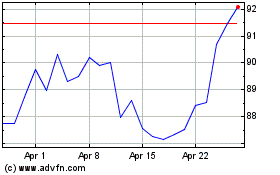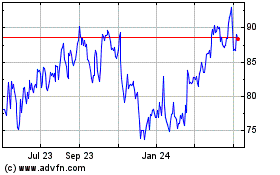By Nicole Friedman and Timothy Puko
Oil prices fell to their lowest point in seven years Monday,
hammering energy industry stocks as many investors bet that heavily
indebted producers, having weathered months of low commodity
prices, are now at greater risk of going out of business.
The selloff hit companies in the markets for oil, petroleum
products, natural gas and coal. Oil prices have fallen so low for
so long now that many investors worry that some companies won't be
able to generate enough income to stay in business and pay off
loans no matter how much oil they pump.
Monday's declines were triggered by forecasts of mild weather
that point to tepid U.S. heating demand through the end of the
year. They extended a rout set off last week when the Organization
of the Petroleum Exporting Countries opted to keep its production
high.
Prices for oil and natural gas have lost more than one-quarter
of their value in the U.S. so far this year, thanks to robust
output and growing inventories. The prospect of soft demand and
unrestrained supply is undermining hopes for a turnaround.
"Investors can't see any evidence that things will get better,"
says Dan Pickering, co-president and head of TPH Asset Management
in Houston, which oversees about $1.5 billion.
Oil futures fell 5.8% to $37.65 a barrel in New York, the lowest
settlement since February 2009. Natural-gas futures fell 5.4% to
$2.067 per million British thermal units in New York, the lowest
level since October.
Shares of a number of high-profile energy companies posted even
deeper losses. Among the biggest losers Monday were Consol Energy
Inc., the biggest producer of natural gas and coal in the
Appalachian Basin, which was down 15%, and Williams Cos., the
Tulsa, Okla.-based operator of pipelines and other infrastructure,
which was down 13%.
Bonds were battered as well. Bonds of Chesapeake Energy Corp.,
which is seeking to restructure some of its debt through an
exchange offer, traded at 32.8 cents on the dollar, a decline of
17%, according to data from MarketAxess Holdings Inc. Oasis
Petroleum Inc. bonds shed 6% to trade at 79 cents. A bond from EP
Energy LLC traded at 80 cents, down about 5%.
The pessimism around energy even spread to pipeline-and-storage
companies that had long been billed as havens from the ups and
downs of the underlying markets. Investors are now concerned the
broader pain will slow the acquisitions and dividend growth that
had drawn them to the sector.
The NYSE Alerian MLP Index, a widely followed benchmark of
pipeline and transportation companies, tumbled 6.2% on Monday.
"Nobody is safe," said Tim Parker, portfolio manager in the U.S.
equity division at T. Rowe Price Group Inc.
Pain from the oil bust already has rippled throughout the
industry. Energy companies have laid off hundreds of thousands of
employees around the world, and oil-producing nations from
Venezuela to Russia are struggling with lower revenue.
The U.S. energy industry, which has boomed in recent years due
to technologies like hydraulic fracturing and horizontal drilling
that have opened vast new fields, has taken a hard hit.
Pipeline firm Kinder Morgan Inc. said Friday it would review its
dividend policy, a move the market has interpreted as a sign that
it and similarly situated firms may cut or cancel payouts to
shareholders to shore up cash.
Consol illustrates the topsy-turvy path some companies have
followed during the energy boom. The Pittsburgh-area company paid
$3.5 billion to buy gas rights near its Appalachian mines in 2010
and shrank its longtime coal-mining business to focus on the
cleaner-burning fuel, then suffered as its shares fell more than
80% this year.
Like many of its peers, Consol keeps expanding production,
telling investors in October that it plans to increase gas output
by 20% in 2016.
In doing so it has locked itself into a cutthroat race with
other gas drillers. This summer, the company announced that it
found one of the biggest gushers in U.S. history, only to see gas
prices and its own share price continue to fall out of fear similar
wells would keep the market glutted for years.
"They need to cut their capital spending," says Rob Thummel,
portfolio manager at Tortoise Capital Advisors, which manages $14.6
billion in energy assets.
Consol is selling assets to raise cash and balancing its budget
using "conservative commodity prices," a company spokesman said in
a statement. "Proceeds from these assets sales will help de-lever
the company, continuing to strengthen our balance sheet and
liquidity position."
Many oil-and-gas companies find it nearly impossible to cut back
because of the large debt loads they took on to fund their growth
when energy prices were higher. That leaves many producing just to
pay their debts. Meanwhile, hedges that have allowed them to sell
oil and gas above the market rate are expiring.
"We think that next year there's going to be more pain in the
sector" says David Yepez, investment analyst at Exencial Wealth
Advisors in Oklahoma City, which manages $1.4 billion. "I think
things are going to get worse before they get better."
The El Niño weather phenomenon has limited demand for natural
gas and other heating fuels in the U.S. this year. Forecasts
released Monday show above-average temperatures persisting for the
next two weeks, at a time of year when demand for indoor heating is
typically robust.
Temperatures in cities in the Midwest and East Coast could range
between 15 and 25 degrees warmer than usual for the next 10 days,
says Matt Rogers, meteorologist and president at Commodity Weather
Group LLC.
Some traders say it is risky to bet on further declines for oil
prices that are already down 29% on the year and well below $40--a
level under which analysts say many producers can't make money and
will have to cut back.
As of Dec. 1, money managers including hedge funds had made an
unusually large number of bets that U.S. crude prices would fall,
according to Commodity Futures Trading Commission data.
That could spark a sharp rally if fund managers close out those
positions at once, traders say. That happened in August, sending
prices up 27% in three sessions.
But Mr. Pickering says mutual funds and other large investors
are reluctant to buy beaten-down shares and bonds during the last
month of the year.
Until global oil inventories begin to shrink, Mr. Pickering
says, "the bears are in control."
Gregory Zuckerman contributed to this article.
Write to Nicole Friedman at nicole.friedman@wsj.com and Timothy
Puko at tim.puko@wsj.com
(END) Dow Jones Newswires
December 08, 2015 00:09 ET (05:09 GMT)
Copyright (c) 2015 Dow Jones & Company, Inc.
Chesapeake Energy (NASDAQ:CHK)
Historical Stock Chart
From Mar 2024 to Apr 2024

Chesapeake Energy (NASDAQ:CHK)
Historical Stock Chart
From Apr 2023 to Apr 2024
